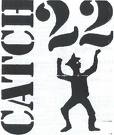Everyday is a Catch-22
 If Joseph Heller where to write Catch-22 today, I often think that Haiti would make a pretty decent setting for the story. Imagine that you had to choose between providing ecological stability for your children or cooking their dinner. Now, I’ll admit that it really isn’t that difficult of a decision, but it is one that countless Haitians face on a daily basis, and is the reason why merely ‘educating’ Haitians on the evils of deforestation will never effectively address the environmental disasters facing the country.
If Joseph Heller where to write Catch-22 today, I often think that Haiti would make a pretty decent setting for the story. Imagine that you had to choose between providing ecological stability for your children or cooking their dinner. Now, I’ll admit that it really isn’t that difficult of a decision, but it is one that countless Haitians face on a daily basis, and is the reason why merely ‘educating’ Haitians on the evils of deforestation will never effectively address the environmental disasters facing the country.
After reading the recent Newsday.com article, Fruit of Their Labor, it appears that the Organization for the Rehabilitation of the Environment (ORE) is an organization that ‘gets it’. They understand that in order to prevent continued deforestation you have to provide those cutting down trees with a measurable and immediate economic incentive. ORE provides farmers with high-quality, quick maturing fruit trees, which provide a greater economic incentive than cutting down cutting down the trees for charcoal. The article estimates that a farmer may earn $50 from each tree as charcoal, but can earn as much as $15 to $45 each year selling fruit from the same tree.
Now, there will be those that argue that this approach does nothing to address the source of the deforestation problem, because the average Haitian will still need to cook her food, and will need to get that charcoal from somewhere. But cooking by charcoal is not the only option available in Haiti, it just happens to be the only option that the majority of Haitians can afford. Organizations like ORE are taking the proactive steps that are necessary to create an economy that can support alternative forms of energy, and create the movement away from the use of charcoal and towards environmental stability.
In the midst of the disturbing news coming from Haiti this week, it is encouraging to hear yet another organization making a difference in Haiti.
Click here to learn how to donate and help save Haiti’s environment.
Add new comment